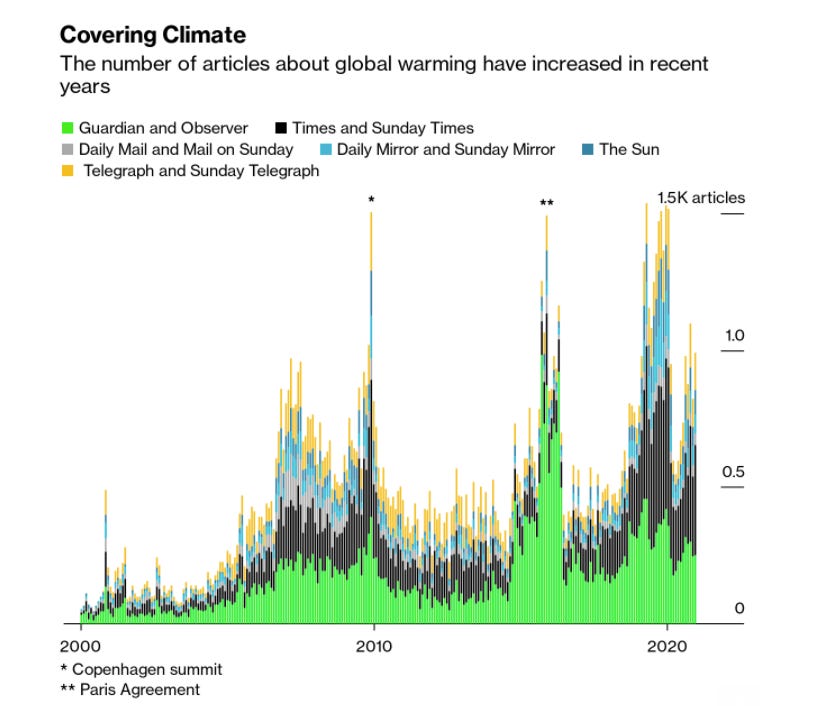This one's for you, Rex
Why Postmedia is hurting the industry it wants to help -- and why federal Conservatives are only making that worse
Last week, I wrote about the infuriatingly inaccurate takes about wind energy’s role in the fallout (and blackouts) from the Texas winter storm, and I regret to inform you that they haven’t exactly stopped since then. Indeed, in an interview with Ryan Jespersen today, former radio host and professional free speech martyr Danielle Smith repeated the usual assortment of misinformation and nonsense that climate change slow-walkers like her use to feed skepticism about renewable energy.
But over at the National Observer, I did my best to push back against this nonsense — and I did it by taking aim at Rex Murphy’s column on the subject. This is not the first time in 2021 that I’ve criticized Murphy’s work, either. Back in January, over at The Line, I wrote about why his enthusiastic interventions on behalf of Alberta’s oil and gas industry aren’t helping anyone — least of all the industry he so clearly and dearly loves.
A good friend doesn’t always tell you what you want to hear, and they don’t send you into fights unprepared for what’s about to happen. Instead, a good friend gives it to you straight — and helps you overcome the challenges that stand in your way.
That industry remains in desperate need of some better friends. And while Postmedia and other right-wing media outlets continue to make good money by telling oil and gas insiders what they want to hear rather than what they need to, there’s an interesting shift happening in other parts of the world. Take this cover from The Economist, which isn’t exactly a far-left publication.
Even more interesting is the apparent conversion on the road to climate Damascus that Great Britain’s right-wing press has had lately. As Bloomberg Green noted last week, the Boris Johnson government’s decision in November to ban the sale of fossil-fuel powered vehicles in 2030 was a tipping point for some of the tabloids there that had previously traded in climate misinformation and myth.
Tabloids like The Sun and The Daily Express tend to be firmly on the right of the political divide. They’ve also been vehemently skeptical of climate change. But now there's growing public concern about global warming, even among their readership.
That concern, it seems, is translating into an appreciable shift in the coverage of these papers — which is no small matter, given the crucial role they played only a few years ago in seeding the ground for the disastrous Brexit movement.
The Daily Express has been one of the most explicitly skeptical of climate science, famously running a story headlined “100 reasons why global warming is natural.” The Sun featured columns by Breitbart News writer James Delingpole blaming the European Union for causing climate change. Now The Daily Express is campaigning for tax breaks on solar panels while The Sun offers tips to help readers shrink their carbon footprints. Delingpole has been dropped.
Will we see a similar shift at Canada’s conservative-leaning newspapers? Only time will tell. But if their recent coverage is any indication, they still have a long way to go before they get there.
Any such shift, of course, would be informed by one in the broader conservative movement that those media outlets serve. Boris Johnson, for example, has been far more willing to embrace the reality of climate change, and the steps his country needs to take to adapt to it, than he was in the past. Here in Canada, and Alberta specifically? Not so much. If anything, our conservatives seem proudly stuck in the past. Witness this tweet from the Member of Parliament for Calgary-Midnapore, in which Stephanie Kusie blames the closure of a downtown YMCA on the federal government “killing industry”.
How, I asked her, did she explain the fact that Houston is also dealing with record-high commercial vacancy rates? Was the Trudeau government also responsible for that, or could there be something else that Calgary and Houston have in common? That question earned me a block.
Kusie is welcome to block anyone she likes, and it appears to be a popular pastime among Calgary CPC MPs. But her unwillingness to account for the possibility that Alberta’s oil and gas industry is, in fact, part of a global commodity market, is symbolic of her party’s continued refusal to reckon with reality. And the longer that happens, the more damage they’re going to do to the industry they profess to love and support.
After all, supporting the auto industry isn’t a partisan issue, and it attracts the support of New Democrats, Liberals, and Conservatives alike. But because of the decision by Stephen Harper to politicize pipelines more than a decade ago, and the willingness of federal Conservatives to continue painting pipeline issues in both partisan and parochial colours, there is no such bi-partisan national consensus when it comes to oil and gas and its role in the Canadian economy. It may be too late to reverse that damage now, but Alberta’s elected Conservative representatives don’t even seem interested in trying. Instead, they prefer to blame Justin Trudeau — no matter the cost to Alberta’s future.
So as I’ve said before, and I’m sure I’ll say again: with friends like Rex Murphy and Stephanie Kusie, does the oil and gas industry even need enemies?





